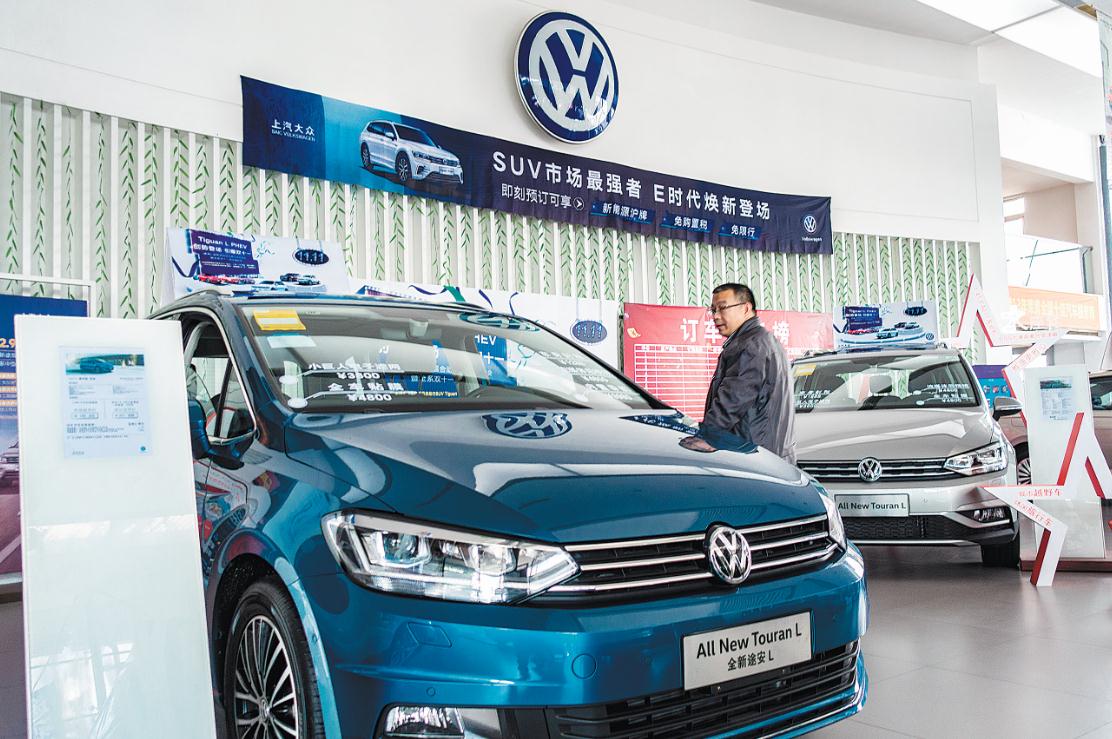Vehicle prices cut in rural areas to invigorate flagging market
By Li Fusheng | China Daily | Updated: 2019-02-25 10:48

Buyers in vast countryside offered massive discounts on new vehicles
Automakers are offering discounts in China's vast rural areas to boost demand in the world's largest automotive market, which has been losing steam since 2018.
Chinese joint venture SAIC Volkswagen announced its package of incentives to rural consumers on Wednesday.
Covering all its models, the discounts range from 2,000 yuan to 30,000 yuan ($300 to $4,460).
SAIC Volkswagen has been the best-selling passenger carmaker in the country for four years. It delivered 2.06 million vehicles last year, basically the same as in 2017. Sales this January, however, fell 11 percent year-on-year.
Changan Oushang, a subsidiary of Chongqing Changan Automotive, is offering up to 22,000 yuan off its sport utility vehicles and multipurpose vehicles sold in the countryside.
Reuters said the company was footing the bill and was not receiving incentives from the government.
FAW-Volkswagen, another Chinese joint venture of Volkswagen, has announced its plan, offering discounts worth up to 12,000 yuan to rural customers on a number of models, including the Jetta and Bora sedans.
"We believe the measure will help foster demand and boost sales, and also benefit more rural customers," said the carmaker in a statement.
FAW-Volkswagen saw its sales go up 2.6 percent year-on-year in 2018. It expects a 4 percent growth in 2019 due to a diverse lineup of new models. It will launch a budget car brand later this month to solidify their presence in smaller Chinese cities.
Commercial vehicle maker Beiqi Foton is cutting up to 3,000 yuan of the price of its pickup models to rural residents.
Such moves from carmakers came after the Chinese government promised last month to roll out supportive policies for the automotive market after it fell 2.76 percent year-on-year in 2018, which marked the first fall since 1990.
Industry analysts said smaller cities that were leading the growth in China's auto sales over the past few years, were hardest hit.
In an action plan released in late January, the National Development and Reform Commission, together with nine other ministries, proposed subsidies on the purchase of small trucks and cars in rural areas.
They also suggested easing restrictions on pickups in cities, helping used car sales and stimulating new energy vehicle sales.
Xu Haidong, an official at the China Association of Automobile Manufacturers, said that new purchases are primarily from smaller cities and rural areas, while cars sold in big cities are mostly trade-in deals.
A report by Shenwan Hongyuan Securities estimates that seven million cars are sold in rural areas every year, representing 25-30 percent of the market.
With discounting, it expects the growth in the rural car market to increase 4.7 percent this year. It expanded 2.6 percent in 2018.
Carmakers are in need of good prospects to bolster their confidence and sales, as vehicle wholesale has not improved so far.
According to the CAAM, vehicle sales in January fell 15.8 percent year-on-year to 2.36 million, and two-thirds of its top 15 carmakers saw sales slip.
Passenger car sales slumped deeper that month, to 17.7 percent compared with last year.
The only comfort came from new energy vehicles. Last month, a total of 96,000 electric cars and plug-in hybrids were sold, up 138 percent year-on-year.
The situation is expected to improve gradually as the measures from both the carmakers and the government are put in place, although it is not clear now how much time it takes before positive growth emerges.
But industry insiders and government officials said there is still room for growth in the long term. "Compared with developed countries, there is still huge room," said Wang Bin, an official with the Ministry of Commerce at a recent news conference, citing statistics that 1,000 Chinese people have around 170 vehicles now, while the figure is around 800 in the United States and some 500 to 600 in Europe and Japan.
But that does not mean all carmakers can have boom times as they did in the past.
Cui Dongshu, secretary-general of the China Passenger Car Association, said the age of fast and assured growth is gone and those who don't respond to market changes will fail. "Declining car sales may speed up the process of squeezing out the incompetent players and we may see some of them exit the market," he said.
























